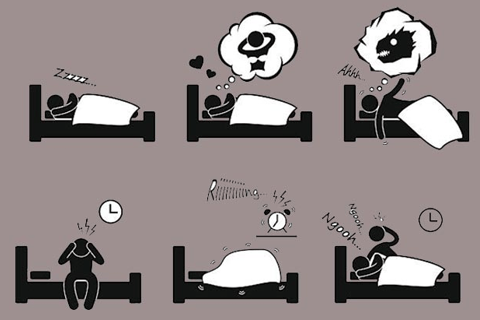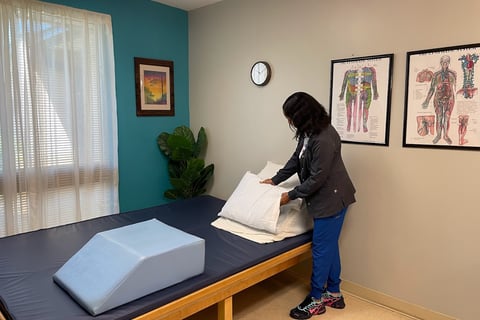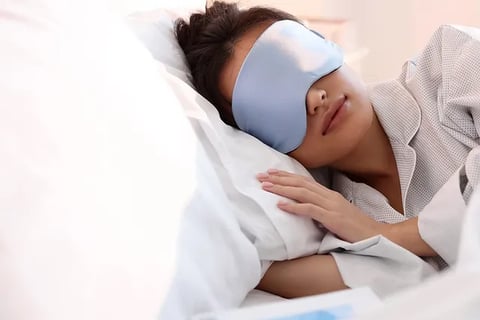Transforming Your Sleep: Expert Sleep Therapy Near Me
Are you struggling with sleep issues and seeking professional help in your area? This comprehensive guide will help you understand sleep therapy, find local services, and take the first steps towards improving your sleep quality.


Understanding Sleep Therapy
Definition of sleep therapy
Sleep therapy, also known as sleep medicine or sleep counseling, is a specialized field of healthcare that focuses on diagnosing, treating, and managing various sleep disorders. This branch of medicine is dedicated to helping individuals achieve better sleep quality and overall well-being. Sleep therapy encompasses a wide range of approaches and techniques designed to address different sleep-related issues.
At its core, sleep therapy aims to identify the root causes of sleep disturbances, which can include conditions such as insomnia, sleep apnea, narcolepsy, restless leg syndrome, and circadian rhythm disorders. By utilizing a combination of medical knowledge, psychological insights, and cutting-edge technology, sleep therapists work to create personalized treatment plans for their patients.
The process of sleep therapy typically begins with a comprehensive assessment of the patient's sleep patterns, habits, and overall health. This may involve sleep studies, where the patient's brain activity, breathing patterns, and body movements are monitored during sleep. Based on these findings, sleep therapists can develop targeted interventions to address specific sleep issues.
Treatment approaches in sleep therapy can vary widely, depending on the diagnosed condition and individual needs. These may include:
Cognitive Behavioral Therapy for Insomnia (CBT-I): A structured program that helps identify and replace thoughts and behaviors that cause or worsen sleep problems with habits that promote sound sleep
Medication management: When appropriate, sleep therapists may prescribe or adjust medications to help regulate sleep patterns
Lifestyle modifications: Recommendations for changes in diet, exercise, and daily routines to promote better sleep hygiene
Light therapy: Using specific types of light exposure to help reset the body's internal clock
Relaxation techniques: Teaching methods such as progressive muscle relaxation, meditation, or deep breathing exercises to reduce anxiety and promote relaxation
By addressing sleep disorders through these comprehensive approaches, sleep therapy aims not only to improve sleep quality but also to enhance overall health, cognitive function, and quality of life. As sleep plays a crucial role in physical and mental health, the benefits of effective sleep therapy can extend to many aspects of an individual's well-being.
Quality sleep is fundamental to overall health and well-being. It plays a crucial role in various aspects of our lives, including:
Physical health: Sleep helps repair and regenerate tissues, supports immune function, and regulates hormones essential for growth and metabolism.
Mental health: Adequate sleep is vital for cognitive function, memory consolidation, and emotional regulation. It helps reduce stress and improve mood.
Performance: Quality sleep enhances concentration, productivity, and decision-making abilities in both professional and personal settings.
Safety: Proper sleep reduces the risk of accidents and injuries caused by fatigue and impaired alertness.
Consistently getting good quality sleep can lead to improved overall health outcomes, increased longevity, and a better quality of life. This underscores the importance of addressing sleep issues through therapy when necessary.
Sleep therapy encompasses a wide range of approaches designed to address various sleep disorders and improve overall sleep quality. Here are some of the key methods used in sleep therapy:
Cognitive Behavioral Therapy for Insomnia (CBT-I): This is a structured program that helps identify and replace thoughts and behaviors that cause or worsen sleep problems. CBT-I typically includes:
Sleep education
Sleep hygiene improvement
Stimulus control therapy
Sleep restriction
Relaxation training
Cognitive restructuring
Light Therapy: This approach uses specific types of light exposure to help reset the body's internal clock (circadian rhythm). It's particularly effective for:
Seasonal Affective Disorder (SAD)
Jet lag
Shift work sleep disorder
Relaxation Techniques: These methods aim to reduce anxiety and promote relaxation, making it easier to fall asleep. Common techniques include:
Progressive muscle relaxation
Deep breathing exercises
Meditation
Guided imagery
Sleep Restriction Therapy: This method involves limiting the time spent in bed to match the actual amount of sleep obtained, gradually increasing sleep time as efficiency improves.
Biofeedback: This technique helps patients learn to control their body's functions, such as heart rate and muscle tension, which can interfere with sleep.
Medication Management: When appropriate, sleep therapists may prescribe or adjust medications to help regulate sleep patterns.
By combining these various approaches, sleep therapists can create personalized treatment plans that address the specific needs and challenges of each individual patient, leading to improved sleep quality and overall well-being.
Finding Sleep Therapy Services Near You
To find sleep therapy services in your local area, follow these comprehensive steps:
Utilize online resources:
Use search engines with specific terms like "sleep therapy near me" or "sleep clinic in [your city name]"
Check online medical directories such as Healthgrades or ZocDoc for sleep specialists in your area
Visit the American Academy of Sleep Medicine's website to find accredited sleep centers
Consult healthcare professionals:
Schedule an appointment with your primary care physician to discuss your sleep concerns and ask for referrals to local sleep specialists
If you have a therapist or psychiatrist, inquire about cognitive behavioral therapy for insomnia (CBT-I) providers in your area
Explore local medical facilities:
Contact nearby hospitals or medical centers and ask about their sleep medicine departments or affiliated sleep clinics
Check if local universities with medical schools have sleep research centers or clinics open to the public
Leverage your insurance network:
Call your insurance provider or visit their website to search for in-network sleep specialists and sleep centers
Ask about coverage for different types of sleep therapy and any required pre-authorizations
Utilize community resources:
Check with local community health centers for affordable sleep therapy options
Look for support groups related to sleep disorders, as they often have information about local resources and specialists
Remember to research the credentials and patient reviews of potential sleep therapy providers before making your choice. It's also a good idea to prepare a list of questions about your sleep concerns to discuss during your initial consultation.
What to Expect from Local Sleep Therapists
When you engage with a sleep therapist near you, you can typically expect a comprehensive and personalized approach to addressing your sleep issues. Here's a more detailed breakdown of what the process usually entails:
An initial consultation and assessment of your sleep patterns
During this first meeting, your therapist will conduct a thorough interview about your sleep habits, lifestyle, and medical history
You may be asked to complete sleep diaries or questionnaires to provide more detailed information about your sleep patterns
The therapist will assess factors that might be contributing to your sleep problems, such as stress, diet, or underlying health conditions
Possible sleep study recommendations (at-home or in-lab)
If necessary, your therapist may suggest a sleep study to gather more objective data about your sleep
At-home studies involve using portable monitoring devices to track your sleep in your own bedroom
In-lab studies, also known as polysomnography, are conducted in a sleep clinic and provide more comprehensive data by monitoring brain waves, eye movements, and other physiological factors
A personalized treatment plan
Based on the initial assessment and any sleep study results, your therapist will develop a tailored treatment plan
This plan may include a combination of behavioral therapies, such as Cognitive Behavioral Therapy for Insomnia (CBT-I), relaxation techniques, and sleep hygiene improvements
If appropriate, the plan might also include recommendations for light therapy, medication, or referrals to other specialists
Follow-up appointments and plan adjustments as needed
Regular follow-up sessions will be scheduled to monitor your progress and make any necessary adjustments to your treatment plan
These sessions may involve reviewing sleep diaries, discussing challenges, and refining techniques to improve your sleep
The frequency of these appointments can vary based on your individual needs and progress
Remember, improving sleep patterns often takes time and consistent effort. Your sleep therapist will work closely with you throughout this process, providing support, education, and guidance to help you achieve better sleep and overall well-being.
Benefits of Choosing Local Sleep Therapy
Opting for sleep therapy near you offers several significant advantages that can greatly enhance your treatment experience and outcomes:
Convenience of nearby appointmentsHaving a sleep therapy provider close to home makes it much easier to attend regular sessions. This convenience can lead to better adherence to your treatment plan, as you're more likely to keep appointments when they don't require long travel times. Additionally, the reduced stress of commuting to appointments can contribute positively to your overall sleep hygiene.
Personalized care tailored to local environmental factorsLocal sleep therapists are often more familiar with region-specific factors that might affect your sleep, such as:
Local climate conditions (e.g., humidity levels, temperature fluctuations)
Seasonal changes in daylight hours
Common allergens in your area that might impact sleep quality
Local lifestyle factors or work patterns unique to your community This localized knowledge allows for more targeted and effective treatment strategies.
Potential for better integration with your existing healthcare providersWhen your sleep therapist is local, they can more easily coordinate with your primary care physician, specialists, or other healthcare providers. This improved communication can lead to:
More comprehensive care
Reduced likelihood of conflicting treatments
Better management of any underlying health conditions that may be affecting your sleep
Seamless sharing of medical records and test results
Access to local support groups and resourcesLocal sleep therapists often have connections to community resources that can complement your treatment, such as:
In-person support groups for individuals with similar sleep disorders
Local wellness centers offering complementary therapies (e.g., yoga, meditation classes)
Community education programs on sleep health
Partnerships with local sleep clinics for more advanced testing if needed These local resources can provide additional support, education, and motivation throughout your treatment journey.
By choosing a local sleep therapy provider, you're not just getting treatment; you're becoming part of a supportive local network dedicated to improving your sleep health. This comprehensive approach can significantly enhance your chances of achieving lasting improvements in your sleep quality and overall well-being.
Alternative and Complementary Approaches
Achieving restful and rejuvenating sleep is more than just a dream—it's an attainable goal with the right lifestyle changes. By making small, deliberate adjustments to your daily routine, you can significantly improve your sleep quality and overall well-being.
Start by establishing a consistent sleep schedule. Going to bed and waking up at the same time every day helps regulate your body's internal clock, making it easier to fall asleep and wake up naturally. Pair this routine with a relaxing pre-sleep ritual, such as reading or taking a warm bath, to signal to your body that it's time to unwind.
Pay attention to your diet as well—what you consume can greatly impact your sleep. Avoid heavy meals, caffeine, and alcohol close to bedtime as they can disrupt your sleep cycle. Instead, opt for light snacks like almonds or chamomile tea that promote relaxation.
Creating an ideal sleep environment is also crucial. Ensure your bedroom is cool, dark, and quiet; consider using blackout curtains or white noise machines if necessary. Investing in a comfortable mattress and pillows can also make a world of difference.
Finally, incorporate regular physical activity into your daily routine. Exercise not only reduces stress but also tires out the body in a healthy way that promotes deeper sleep cycles.
By embracing these lifestyle changes for better sleep, you'll find yourself waking up more refreshed and ready to tackle each day with renewed energy and focus.
In today's fast-paced world, many individuals are turning to natural remedies and supplements as a way to support their health and well-being. These alternatives offer a compelling option for those seeking to enhance their lifestyle without relying solely on pharmaceutical solutions. Natural remedies, derived from herbs, plants, and other organic sources, have been used for centuries across various cultures to treat ailments and promote overall wellness.
Supplements provide the essential nutrients that might be missing from our diets. They can help fill nutritional gaps, boost energy levels, and strengthen the immune system. By incorporating these natural options into your daily routine, you can take proactive steps towards maintaining your health in a balanced and holistic manner.
Moreover, many people find comfort in knowing they are using products that align with nature's offerings rather than synthetic alternatives. As more research emerges supporting their efficacy and safety, natural remedies and supplements continue to gain popularity among those committed to nurturing their bodies naturally.
Embracing these options means empowering yourself with choices that prioritize long-term health benefits while respecting the body's innate ability to heal itself. It's time we recognize the value of integrating natural remedies into our lives—taking control of our well-being has never been more accessible or rewarding.
In today's fast-paced world, a good night's sleep often feels like a luxury rather than a necessity. However, with technology-assisted sleep improvement, achieving restful and rejuvenating slumber is more attainable than ever. These innovative solutions leverage cutting-edge technology to address common sleep issues, making it easier for individuals to enjoy the benefits of quality rest.
One of the most compelling aspects of technology-assisted sleep improvement is its ability to personalize the sleep experience. With devices that monitor your sleeping patterns and provide insights into your habits, you can identify what might be disrupting your rest and make informed adjustments. This data-driven approach ensures that you're not just guessing at solutions but implementing strategies backed by real-time information.
Furthermore, smart beds and pillows equipped with sensors can adjust their firmness or temperature based on your preferences throughout the night. This level of customization means you're more likely to stay comfortable and asleep longer, without frequent awakenings caused by discomfort.
For those who struggle with falling asleep in the first place, technology offers soothing soundscapes or guided meditation apps designed to relax both body and mind before bedtime. These tools help create an ideal environment for winding down after a hectic day.
Embracing technology-assisted sleep improvement doesn't mean relying solely on gadgets; it's about enhancing natural processes with thoughtful innovations. By integrating these advancements into our nightly routines, we can reclaim our nights for restfulness and wake up ready to conquer each new day with vitality and focus.
Frequently Asked Questions (FAQs)
How do I know if I need sleep therapy?If you consistently have trouble falling asleep, staying asleep, or feeling rested after sleep, you may benefit from sleep therapy. Other signs include loud snoring, gasping during sleep, or feeling excessively tired during the day.
What types of sleep therapy are available near me?Common types of sleep therapy include Cognitive Behavioral Therapy for Insomnia (CBT-I), light therapy, relaxation techniques, and sleep restriction therapy. The availability of specific therapies may vary by location, so it's best to check with local providers.
How much does sleep therapy cost in my area?The cost of sleep therapy can vary widely depending on your location, the type of therapy, and your insurance coverage. Many insurance plans cover sleep therapy, but it's important to check with your provider and local clinics for specific pricing information.
How long does sleep therapy typically last?The duration of sleep therapy varies depending on the individual and the specific sleep issue. Some people may see improvements in just a few sessions, while others may benefit from longer-term treatment. Your local sleep therapist can provide a more accurate timeline based on your specific needs.
Can I do sleep therapy online or does it have to be in person?Many sleep therapists now offer online or telemedicine options, especially for cognitive behavioral therapy. However, some aspects of sleep therapy, such as certain types of sleep studies, may require in-person visits. Check with local providers to see what options are available near you.
Taking the Next Step
If you're ready to improve your sleep quality, don't hesitate to reach out to a sleep therapy provider near you. Remember, seeking professional help is a proactive step towards better health and well-being. Use the resources and information provided in this guide to find the right sleep therapy solution in your local area.
By addressing your sleep issues with a qualified local professional, you're investing in your overall health and quality of life. Sweet dreams are just around the corner!
Video
Importance of quality sleep for overall health


Common sleep disorders








Lifestyle changes for better sleep


Natural remedies and supplements


Technology-assisted sleep improvement


Discover tips for sleep, detox, and mindfulness.
© 2024. All rights reserved.
